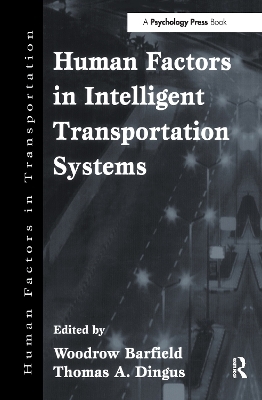
Human Factors in Intelligent Transportation Systems
Psychology Press (Verlag)
978-0-8058-1433-0 (ISBN)
The Intelligent Transportation System (ITS) Program is a cooperative effort by government, private industry, and academia to apply advanced technology to the task of resolving the problems of surface transportation. The objective is to improve travel efficiency and mobility, enhance safety, conserve energy, provide economic benefits, and protect the environment. The current demand for mobility has exceeded the available capacity of the roadway system. Because the highway system cannot be expanded, except in minor ways, the available capacity must be used more efficiently to handle the increased demand.
ITS applies advanced information processing, communication, sensing, and computer control technologies to the problems of surface transportation. Considerable research and development efforts will be required to produce these new technologies and to convert technologies developed in the defense and space programs to solve surface transportation problems.
ITS has been subdivided into six interlocking technology areas. This book addresses human factors concerns for four of these areas:
* Advanced Traveler Information Systems are a variety of systems that provide real time, in-vehicle information to drivers regarding navigation and route guidance, motorist services, roadway signing, and hazard warnings.
* Advanced Vehicle Control Systems refer to systems that aid drivers in controlling their vehicle particularly in emergency situations and ultimately taking over some or all of the driving tasks.
* Commercial Vehicle Operations address the application of ITS technologies to the special needs of commercial roadway vehicles including automated vehicle identification, location, weigh-in-motion, clearance sensing, and record keeping.
* Advanced Traffic Management Systems monitor, control and manage traffic on streets and highways to reduce congestion using vehicle route diversion, automated signal timing, changeable message signs, and priority control systems.
Two technical areas are not specifically addressed in individual chapters, but many aspects of them are covered in associated chapters:
* Advanced Rural Transportation Systems include systems that apply ITS technologies to the special needs of rural systems and include emergency notification and response, vehicle location, and traveler information.
* Advanced Public Transportation Systems enhance the effectiveness, attractiveness and economics of public transportation and include fleet management, automated fare collection, and real-time information systems.
Woodrow Barfield, Thomas A. Dingus
Contents: Series Foreword. Preface. T. Mast, Introduction to ITS. M.C. Hulse, T.A. Dingus, W. Barfield, Description and Applications of Advanced Traveler Information Systems. J.D. Lee, B.H. Kantowitz, Perceptual and Cognitive Aspects of Intelligent Transportation Systems. T.A. Dingus, S.K. Jahns, A.D. Horowitz, R. Knipling, Human Factors Design Issues for Crash Avoidance Systems. W.A. Wheeler, J.L. Campbell, R.A. Kinghorn, Commercial Vehicle-Specific Aspects of Intelligent Transportation Systems. L. Levitan, J.R. Bloomfield, Human Factors Design of Automated Highway Systems. M.J. Kelly, D.J. Folds, The Advanced Traffic Management Center. F. Mannering, Modeling Driver Decision Making: A Review of Methodological Alternatives. J.H. Spyridakis, A.E. Miller, W. Barfield, Usability Evaluation for Intelligent Transportation Systems. R.N. Fleischman, T.A. Dingus, Human Factors Participation in Large-Scale Intelligent Transportation System Design and Evaluation. L. Ng, W. Barfield, J.H. Spyridakis, Survey Methodologies for Defining User Information Requirements. L. Ng, W. Barfield, Determining User Requirements for Intelligent Transportation Systems Design. T.A. Dingus, M.C. Hulse, W. Barfield, Human-System Interface Issues in the Design and Use of Advanced Traveler Information Systems. F.H. Landau, M.N. Hanley, C.M. Hein, Application of Existing Human Factors Guidelines to ATIS.
| Erscheint lt. Verlag | 13.12.1997 |
|---|---|
| Verlagsort | Philadelphia |
| Sprache | englisch |
| Maße | 152 x 229 mm |
| Gewicht | 929 g |
| Themenwelt | Informatik ► Theorie / Studium ► Künstliche Intelligenz / Robotik |
| Technik ► Elektrotechnik / Energietechnik | |
| ISBN-10 | 0-8058-1433-7 / 0805814337 |
| ISBN-13 | 978-0-8058-1433-0 / 9780805814330 |
| Zustand | Neuware |
| Haben Sie eine Frage zum Produkt? |
aus dem Bereich


